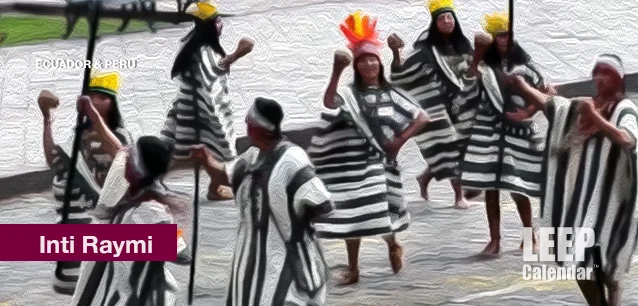 AD
AD
Today is: December 30
Scroll to explore events active on this date.
Additional Events on LEEP
LEEP INK FEATURES

August? Absolutely!
In August, we live through the Dog Days of Summer. It's hot and often humid, and those who can leave for better climates do. Down south, winter is in full force. August is also known as "the ...

In The Heat of July: July 2025 Events
Is it hot enough (or cold enough if you're below the equator) for you yet? There is actually a day for that! Like every month, I pick a diverse collection of events you may or may not know about. This ...

May Blooms: Events in May 2025
Along with October, May is one of the most densely packed months of the year. It's before the summer humidity and the last whole month of the school year. The weather is warming in t...
About Inti Rami
Culture & Art , Other Religions
Festivals & Fairs , Brazil & South America
Ends: Jun 29, 2024
DESCRIPTION:
nti Raymi, often spelled as Inti Rami in English, is a traditional Incan festival that honors Inti, the sun god. Today, Inti Rami occurs in several Andean countries, including Ecuador and Peru.
Historical Background:
Inti Raymi dates back to the time of the Inca Empire. It takes place on the winter solstice when the sun is furthest from the Earth's Southern Hemisphere and honors the god Inti and pleads for his return. In Inca mythology, Inti was considered the ancestral father of the Inca people, so the festival held significant religious importance.
When the Spanish conquistadors arrived, they suppressed Inti Raymi and other indigenous ceremonies as they sought to convert the local population to Christianity. The festival was banned for many years and only survived in some remote communities.
The modern-day revival of Inti Raymi began in the mid-20th century. In 1944, Faustino Espinoza Navarro organized a historical reconstruction of the Inti Raymi in Cusco, Peru. Since then, the festival has grown in popularity and is now a major event attracting thousands of visitors yearly.
Experience of the Festival:
In Peru, the main Inti Raymi event occurs at Sacsayhuamán, an Inca ruin near Cusco. The celebration starts in the morning at Qorikancha, the ancient Inca temple of the sun. The procession then moves to the main square of Cusco before ending at the large, open amphitheater of Sacsayhuamán.
Theatrical performances and reenactments of traditional Inca ceremonies highlight the festival. These include an Inca ritual of the sun, offerings to Pachamama (Mother Earth), the coca leaf ceremony, and the ceremonial lighting of the fire. The performance ends with a procession back to Cusco.
The participants, dressed in traditional Inca costumes, create a vibrant and captivating spectacle. The combination of the setting, the ceremony, and the feeling of being connected to a tradition thousands of years old form a unique and moving experience for spectators.
In Ecuador, Inti Raymi is often combined with the Catholic celebration of Corpus Christi, reflecting the blending of indigenous and Catholic traditions. The celebrations last several days and involve music, dancing, and feasting. In certain communities, men fight ritualistically (Tinku) to ensure a good harvest.
Visitors to either Peru or Ecuador during the time of Inti Raymi will find themselves immersed in a cultural experience that blends history, tradition, and spirituality. The festival provides a glimpse into the rich cultural heritage of the Andean peoples and their enduring connection to the natural world.
VIDEOS
SUPPORTING DOCUMENTS
Currently, this event does not have supporting documents.
ADDITIONAL IMAGES
Currently, this event does not have supporting images.
Where would you like to go now?
 AD
AD


/footer-logo.svg)
